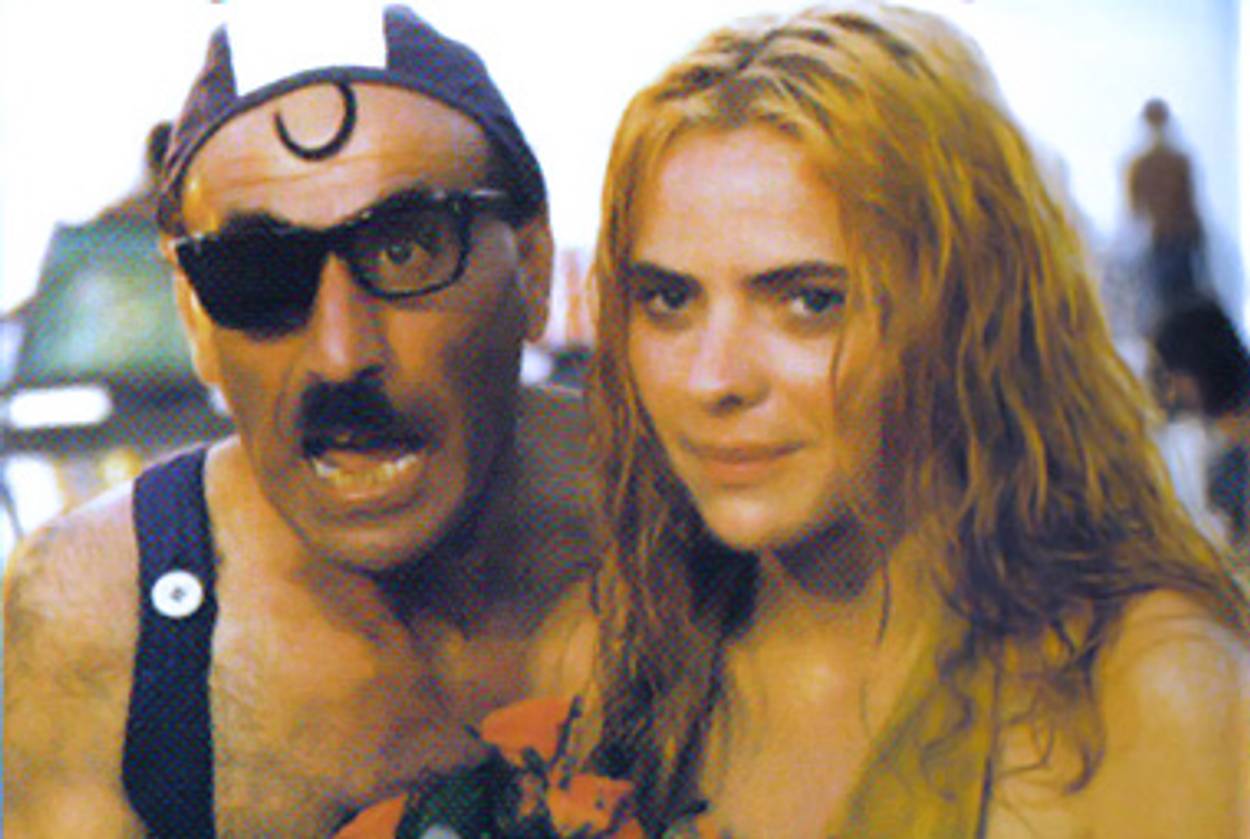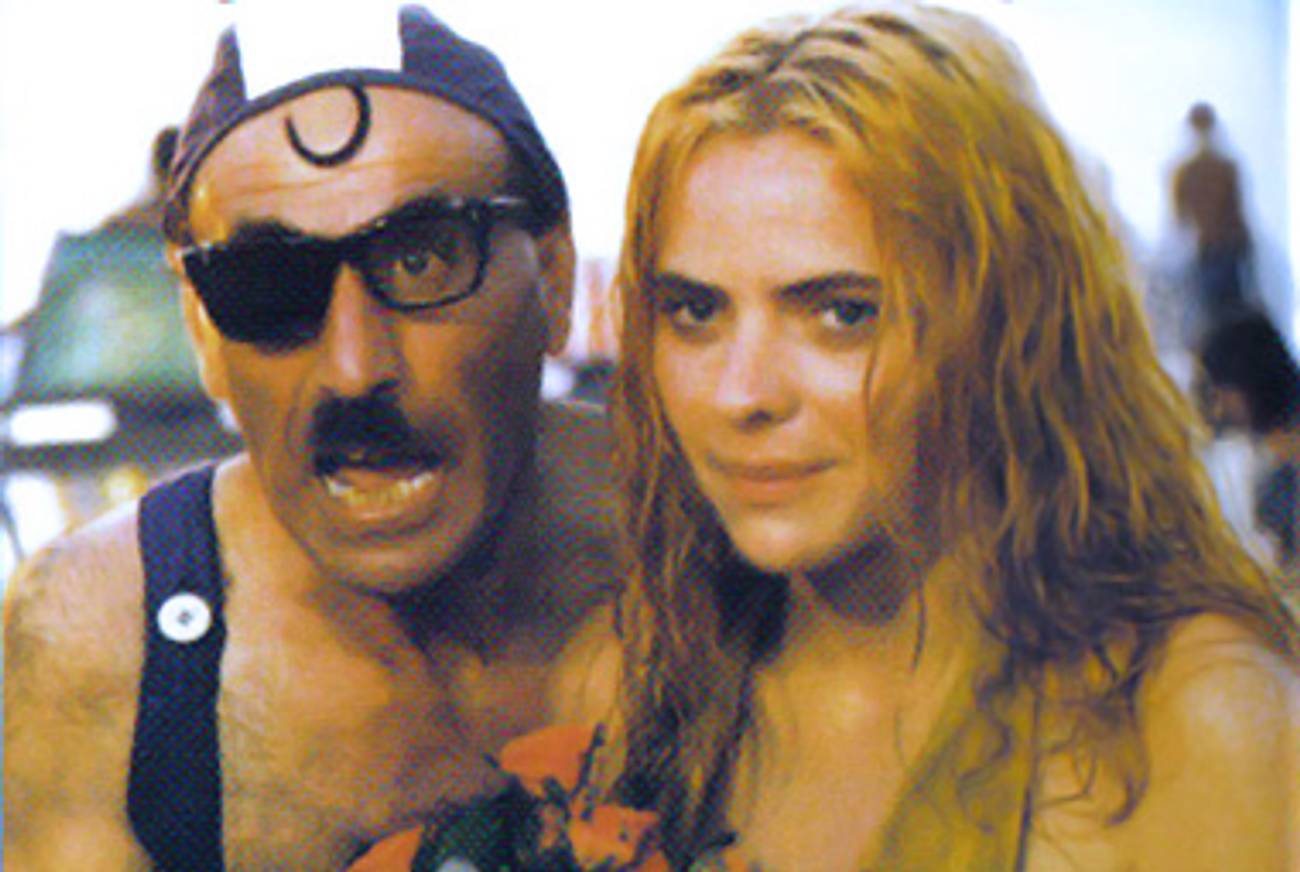Reel Deal
Yosef Shiloach, who died Monday, was Israel’s greatest comic actor, but his films helped the country grapple with its most serious issues




Yosef Shiloach died Monday. More than any other actor, he was the face of Israeli cinema in the last four decades. Whether he played a cantankerous tenant, a prickly staff sergeant, or an ill-tempered gangster, Shiloach’s character was always the same: a bold and mustachioed buffoon who spoke with a thick Persian accent, a spirited, open-mouthed lilt that sounded like a marriage between solfège and an air-raid alarm. His many fans found the repetition delightful; the stereotype never failed to amuse. But the critics scoffed—the sort of films Shilaoch was known for, they argued, were Sirtei Bourekas, or bourekas films.
It wasn’t a compliment. The boureka—a hunk of puff pastry stuffed with cheese or vegetables—is a popular treat in Israel, the sort of snack one would grab after a long night of drinking or as a speedy alternative to lunch. And in the Israel of the 1960s and 1970s—a nation frantically trying to dull the force of its ethnic and economic divides—it had come to represent the Mizrahis, those Jews who emigrated to Israel from Arab countries and who were traditionally poorer and less educated. Much as the boureka was an unsophisticated food, went the common perception, bourekas films were unsophisticated films. Both were devoid of anything by way of real nutritional value and appealed only to those who didn’t know any better.
For the most part, the artistic and intellectual elite treated the rise of bourekas films, in the late 1960s, as further proof of the inherent inferiority of their Mizrahi brethren. The Mizrahis, David Ben Gurion had famously claimed, were “illiterates without a trace of Jewish or human education;” to a generation of Ashkenazi filmmakers reared on Goddard and Truffaut, the slapstick comedy and stereotypical characters of the bourekas films seemed to prove Ben Gurion’s point.
The movie-going audience, however, disagreed. Actors like Shilaoch were big at the box office, and their memorable roles became instantly iconic. For Purim in 1986—the year Shilaoch’s most famous film, Alex Holeh Ahava (Alex Is Lovesick), came out—half the kids in my school dressed up in bathrobes and donned eyeglasses with one lens missing; they were imitating Shiloach’s character, Faruk, a lecherous and hysterical kook who was the film’s comic relief. We young fans didn’t much care that Faruk, like most of Shiloach’s roles, was designed to highlight the tension between the warm, traditional Mizrahis and the removed, imperious Ashkenazis. We didn’t realize that each bourekas film was in some ways a story of the Mizrahi protagonist’s attempt to convince the Ashkenazi establishment of his worthiness, usually by marrying the daughter of some wealthy snob. We were in it for the funny accents and the goofy props. We were never disappointed.
Shilaoch, however, was. A serious actor, a political activist, and a fierce critic of Israel’s occupation of the West Bank and the Gaza Strip, he spent his entire career lamenting having become the embodiment of an ethnic joke. His characters, he argued, possessed the universal appeal of Buster Keaton’s little general or Chaplin’s tramp; that they had a thick accent mattered little. But few, if any, listened, and Shiloach was typecast as the Mizrahi fool in film after film.
It wasn’t how he’d imagined things. Born in Kurdistan in 1941, he emigrated to Israel when he was 9 and settled with his parents in a ghetto south of Tel Aviv. Impoverished, he had to forgo an education and was sent to work in sanitation instead; cleaning the local movie theater, he fell in love with cinema and vowed to become an actor. If he could be like the celebrated men on the screen, he thought, he could overcome that sense of exclusion that stabbed him each morning when, walking to work, he watched children his age, neatly dressed and well-scrubbed, marching to school.
Shiloach’s talent was evident, and he was one of the first class of thespians that graduated from Beit Tzvi, the country’s most renowned acting school. In the first five years of his career, he acted in three films nominated for an Academy Award for best foreign film, including The Policeman in 1970, I Love You Rosa in 1972, and The House on Chelouche Street in 1973. None made him a star; that happened only in 1975, when he portrayed the bumbling mob boss Salvador in Hagigah Ba’Snooker (A Party in the Pool Hall). It’s a more subtle role than the ones Shiloach later portrayed, but the components of his renowned screen persona—the shifty eyes, the singsong voice, the irate twitch—are all there. By 1985, when he put on an army uniform two sizes too small to portray Sgt. Shemesh in the blockbuster military-themed farce Sapiches, his transformation into everyone’s favorite laughingstock was complete.
But Shiloach himself was far from amused. Increasingly exasperated by what he perceived to be Israel’s inexcusable oppression of the Palestinians, he loathed playing the clown, especially when the clown’s comedy was based on a rank ethnic stereotype, that of the Mizrahi as hopelessly unevolved. A stint as the voice of Arik—Israel’s version of Ernie—on Rehov Sumsum, Israel’s Sesame Street, helped rid Shiloach of his existential woes for a while, but rage was never far from his mind. In the late 1980s, at a time when most of his peers were reaping the rewards of stardom, he left Israel, telling no one where he was headed. Years later, an Israeli newspaper reporter spotted him on a Parisian boulevard painting impromptu portraits of passing tourists; he told her he would only return to Israel when there was peace. In 1991, with the Madrid Conference ushering in the era of direct diplomatic negotiations between Israel and its Arab neighbors, Shiloach came back, settling in Jaffa and immersing himself in political activism. Most of his fans, however, knew little about and cared little for his endeavors; for them, he was that funny Persian guy from the movies. Frequently accosted on the street with a demand to repeat one of his famous lines, he smiled meekly and nodded his head, recognizing the request but refusing to honor it.
In 2009, after a series of supporting roles in critically acclaimed films, Shiloach was finally honored with a lifetime achievement award from the Israeli film academy. Already stricken with cancer, he struggled to attend the ceremony. To the cultural establishment that had finally embraced him, he had this to say: The bourekas films were Israel’s true culture, a rich and complex contribution worthy of praise.
Looking back on Shiloach’s life and work, it’s hard not to agree. The bourekas films were always a little exploitative, and their depictions of Mizrahi characters might have made more sophisticated moviegoers wince; but like all good satire they were also extraordinarily nimble vehicles with which to explore complicated subjects like race, class, gender, and religion. Laughing with Shiloach’s clowns, Israelis had a chance—to use the parlance of psychotherapy—to work through the childhood traumas that plagued the young nation and learn to blunt their fears, drives, and divides.
Had he read the paragraph above, Shiloach would have most likely sneered. As he repeatedly told reporters, he valued the craft itself above all, and believed that no amount of cultural contextualization could do justice to the raw power of a great performance. The art, he insisted, spoke for itself. I know just what he means: Saddened by the news of his death, I put on Alex Holeh Ahava and fast-forwarded to my favorite scene, the one in which Faruk, a live chicken placed clandestinely in his bed, believes the beast to be a demon who’d come to claim his soul. I had watched the performance a hundred times or more, but I still found myself roaring with laughter, the sort of laughter that grows and grows until there’s no room for any other emotion, the sort of laughter that only a true master can evoke.
Liel Leibovitz is a senior writer for Tablet Magazine and a host of the Unorthodox podcast.
Liel Leibovitz is editor-at-large for Tablet Magazine and a host of its weekly culture podcast Unorthodox and daily Talmud podcast Take One. He is the editor of Zionism: The Tablet Guide.